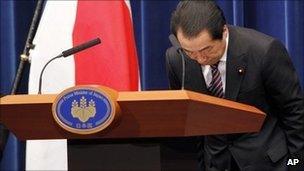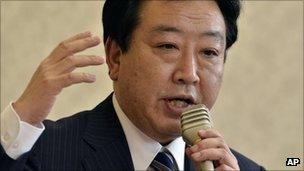Japan prime minister: Why the choice of leader matters
- Published

Naoto Kan's resignation had been widely expected
Prime Minister Naoto Kan is stepping down. His party, the Democratic Party of Japan, is scheduled to elect his successor on Monday 29 August.
Does it matter though? One popular view of Japanese politics is that the personality of the prime minister does not matter.
A Japanese prime minister is often merely a figurehead who sits above an army of generally competent government officials who make the real decisions.
In my view, this understanding does have some truth. After all, political leaders anywhere in the world, however great they are, often do not have the luxury of actually making choices; choices are usually forced upon them by economic or political circumstances.
However, having seen how badly Prime Minister Naoto Kan has performed, we do sense that the choice of leader does matter, especially in these turbulent times.
In my view, besides the mishandling of the crisis after the earthquake, Mr Kan made a few grave mistakes.
One big sin was his landslide loss in the Upper House elections in summer 2010.
By giving up control of the Upper House, the chances of the Japanese government being able to push through painful but necessary reforms, including raising taxes, diminished significantly.
His mishandling of the aftermath of the disaster also diminished the confidence of Japanese businesses in operating within Japan.
His anti-nuclear policy, while probably legitimate at other times, was very ill-timed.
By preventing nuclear power plants from being brought back into operation, he risked economically damaging power outages in Japan.
Japan seems to have gone through the summer without such incidents, but the circumstances could have been different if Japan had experienced a much hotter summer.
Leading candidate

Finance Minister Yoshihiko Noda has been working with the central bank to try to weaken the yen
So, if the choice of Prime Minister does matter after all, who would be the best choice as Mr Kan's successor?
The field of candidates is still wide, although there are only three days to go before the election.
In my view, the current finance minister, Yoshihiko Noda, could be the leading candidate.
He has done an excellent job as finance minister, especially in his handling of exchange rate policy.
Despite the financial turbulence in the past month, the level of the yen against US dollar is hardly changed from a month ago.
He managed the situation well, with a combination of direct foreign exchange intervention and quantitative easing by the Bank of Japan.
Further challenges
In addition, Mr Noda's reputation as a fiscal hawk should help anchor confidence in Japan's debt sustainability.
While it is doubtful that Mr Noda would be able to impose any major tax hikes in the near term, he seems more aware of the fine balance between growth and long term fiscal sustainability.
Of course there are other challenges, such as deregulation and measures to encourage new entrants into the shrinking Japanese workforce, but convincing the Japanese population of the need for fiscal responsibility is the priority for the incoming prime minister.
The Japanese population is actually aware of such a need, it just needs a credible leader to handle the transition of Japan's fiscal policy.
Barrier to growth?
Is the current level of the yen unbearable for Japan?
The value of 77 yen per dollar is tough, but it should not be crippling.
While the nominal exchange rate may be historically high, it overemphasises the competitive disadvantage it puts Japanese businesses in.
In the last 10 years, wages in Japan have fallen by 3%, while those in US have risen by close to 30%.
The yen could have appreciated by 30% in the last 10 years and Japanese business competitiveness should have remained the same.
There are also ample historical examples when the economy managed to perform well despite yen appreciation.
Between 2002 and 2004, the Japanese yen appreciated against the US dollar from 130 to 100.
Did Japanese manufacturers suffer declines in profits?
No - on the contrary, Japanese manufacturers enjoyed robust profit growth in these years, averaging 29% a year.
Admittedly, the global economy was enjoying healthy growth at that time, with the OECD countries on average growing by 2.3%.
However, this still proves the point that growth matters more than the exchange rate.
In the current global environment, where supply chains run across borders, companies can adapt to changing exchange rates by adapting their supply chains.
What Japanese companies need is time to adjust to new exchange rates, rather than vainly trying to maintain an advantageous exchange rate.
The opinions expressed are those of the author and are not held by the BBC unless specifically stated. The material is for general information only and does not constitute investment, tax, legal or other form of advice. You should not rely on this information to make (or refrain from making) any decisions. Links to external sites are for information only and do not constitute endorsement. Always obtain independent, professional advice for your own particular situation.
- Published26 August 2011
- Published26 August 2011
- Published26 August 2011